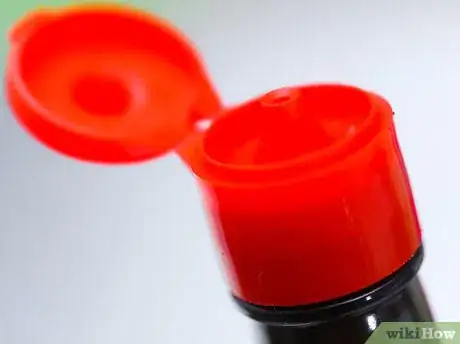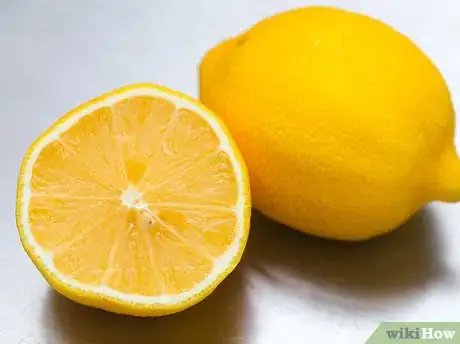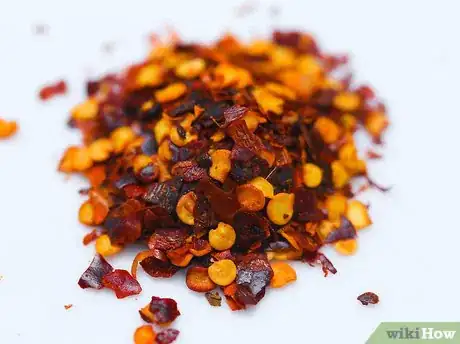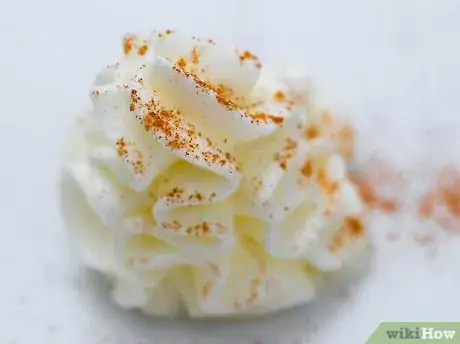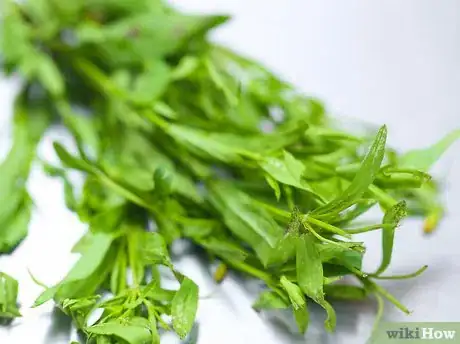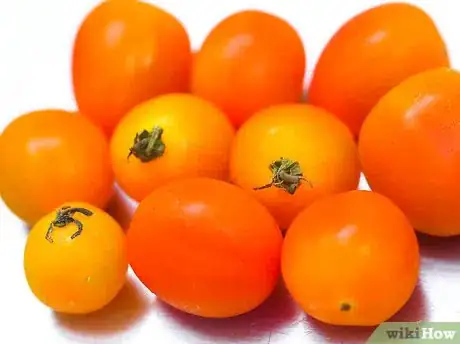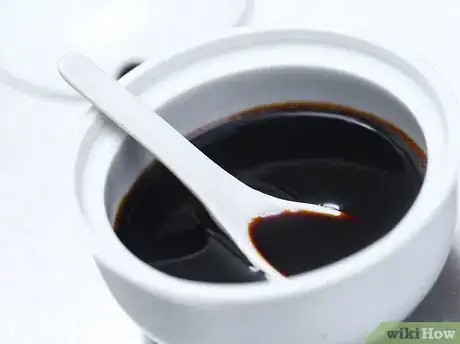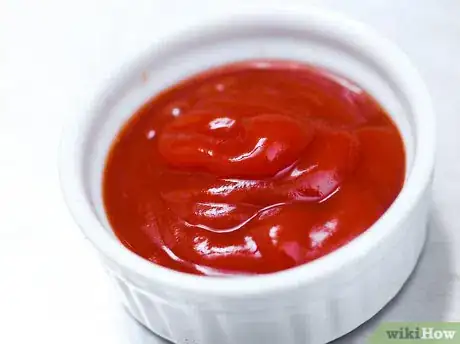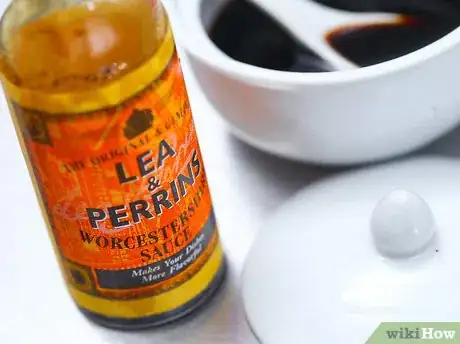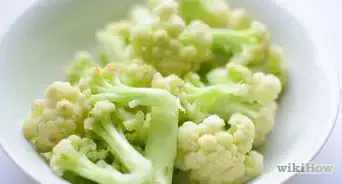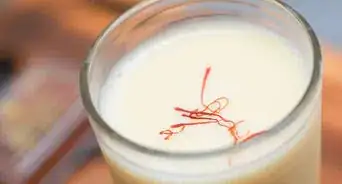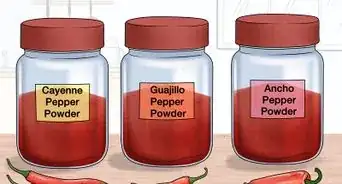wikiHow is a “wiki,” similar to Wikipedia, which means that many of our articles are co-written by multiple authors. To create this article, volunteer authors worked to edit and improve it over time.
There are 14 references cited in this article, which can be found at the bottom of the page.
This article has been viewed 103,797 times.
Learn more...
Bland food happens––soups, stews, casseroles, desserts and other dishes can often taste ordinary. Fixing blandness by adding flavor is a great way to save the meal and still enjoy eating it. If you ever think you have the perfect dish, then you taste it and it has no flavor, these tips will help enhance the flavors in your dish.
Steps
Seasoning
-
1Use house seasoning. Otherwise known as salt and pepper, adding a dash of this simple seasoning will improve many dishes. Add a small amount and taste as you go.[1]
- Freshly ground salt and pepper will taste fresher and sharper than already ground versions.
-
2Add a dash of a prepared seasoning. There are many varieties of prepared seasoning that can be purchased. Some are generic and suit a range of savory dishes, while others are targeted to particular foods. Follow the instructions accompanying the seasoning.Advertisement
-
3Make and use your own general seasoning. Seasoning mixes aren't hard to make at home in large batches for use over several months. You can be absolutely sure about what the mix contains, making this an even better option. Examples include:
- Seasoned salt
- Seasoned pepper
- Chicken and rice seasoning mix
- Taco seasoning mix
- Italian herb seasoning.
Citrus
-
1Try lemon juice. Lemon juice is said to be a healthier alternative for salt. It has a tangy flavor and enhances flavors like no other.[3]
- Add 2 tablespoons to a salad dressing or fish dish.
-
2Try lime juice. This has a milder but more distinct taste than a lemon. The bitterness can give a dish that bite it needs.[4]
- Add 2 tablespoons.
Spice
-
1Use hot sauce. The all time favorite. It gives food a spicy, tangy flavor. It can be added to literally any dish! Add as much as you'd like.[5]
-
2Use spices to improve the flavor of both savory and sweet dishes. There are many possibilities for improving food with spice.[6] Start by checking out How to use spices in cookery.
-
3Use spices with a bit of kick to improve chill and other dishes that need a hot kick. For example, cayenne, paprika, strong black pepper, etc.[7]
-
4Improve the flavor of a bland sweet pie with spices. It's already too late to fix the pie but you can add pumpkin pie spice or similar to the whipped cream or sauce that goes with the pie. Or, add sweet spices to powdered sugar and sprinkle over every slice of pie.
Herbs
-
1Prefer fresh herbs over dried herbs where possible. On the whole, fresh herbs have a better flavor and will add great taste to help remove blandness from food.[8]
- Consider growing a kitchen herb garden of your most-used herbs to make it easy to add the herbs to any dish as needed.
-
2Use celery salt or celery seed. This has a strong flavor which is good for improving a bland soup or stew.[9]
Sauces
-
1Add a decent dash of soy sauce. The saltiness and flavor of soy sauce will improve a bland soup, stew, stir-fry and other savory dishes that have a liquid component.[11]
-
2Add ketchup or tomato sauce. The acidic flavor adds one dimension, while any additional flavorings in the sauce will add depth to the dish too.
-
3Pour in a little Worcestershire sauce. This is a strongly-flavored sauce, so don't overdo it or you'll be looking for how to tone down the flavor. Add a dash or two to soups, stews and similar savory dishes.[12]
Alcohol
If you don't mind adding a dash of alcohol to a dish, there are a few varieties that can fix blandness in food.
-
1Use sherry. It can be either drinking sherry or cooking sherry; whichever, it will add flavor to bland soups, casseroles, stews, chilli, etc.[13]
-
2Add white wine. White wine can add acidity and sweetness to a bland dish. It's a good way to use up the last of a bottle.[14]
- Dry vermouth can also add flavor in the same way as white wine.
Community Q&A
-
QuestionHow do I spice up a dish with pork and sauteed vegetables?
 Community AnswerHerbs that go well with pork are caraway seeds, coriander, cumin, curry powder, dill, garlic, rosemary, sage, fennel, savory and thyme. On the spicy side, you might use chilies, chili powder, cayenne pepper or paprika.
Community AnswerHerbs that go well with pork are caraway seeds, coriander, cumin, curry powder, dill, garlic, rosemary, sage, fennel, savory and thyme. On the spicy side, you might use chilies, chili powder, cayenne pepper or paprika. -
QuestionWhat can I do to remedy tasteless goulash?
 Community AnswerI had the same problem with my goulash, even though I had added everything the recipe called for. Since my goulash was already fully stewed, it was a little late to add more spices. I added Bragg's Liquid Aminos (from their spray bottle, which is much easier to dose than their regular pour bottle) until bland gave way to flavor. (I find the Bragg's Liquid Aminos to be more flavorful than regular salt for many recipes.) I also added cracked black pepper to individual servings. This quick fix salvaged our otherwise bland pot of goulash!
Community AnswerI had the same problem with my goulash, even though I had added everything the recipe called for. Since my goulash was already fully stewed, it was a little late to add more spices. I added Bragg's Liquid Aminos (from their spray bottle, which is much easier to dose than their regular pour bottle) until bland gave way to flavor. (I find the Bragg's Liquid Aminos to be more flavorful than regular salt for many recipes.) I also added cracked black pepper to individual servings. This quick fix salvaged our otherwise bland pot of goulash! -
QuestionHow do I make potatoes seem less bland?
 Elizabeth La FolletteCommunity AnswerGarlic powder sprinkled in appropriate amounts can make any savory dish even better. Garlic powder has a bolder flavor than clove garlic and it can make the dish pop. Using sea salt as opposed to regular granulated salt is also good. A touch of lemon can also spice up boring potato wedges.
Elizabeth La FolletteCommunity AnswerGarlic powder sprinkled in appropriate amounts can make any savory dish even better. Garlic powder has a bolder flavor than clove garlic and it can make the dish pop. Using sea salt as opposed to regular granulated salt is also good. A touch of lemon can also spice up boring potato wedges.
Things You'll Need
- Salt
- Pepper
- Lemon juice
- Mustard
- Lime juice
- Hot sauce
References
- ↑ https://www.cooksillustrated.com/how_tos/6297-seasoning-tips-for-improving-flavor
- ↑ https://www.epicurious.com/expert-advice/18-ways-to-cook-with-dijon-mustard-article
- ↑ https://www.epicurious.com/ingredients/how-to-use-lemon-juice-to-finish-a-dish-recipes-article
- ↑ https://www.recipetips.com/kitchen-tips/t--963/all-about-limes.asp
- ↑ https://www.thekitchn.com/10-ways-to-use-up-hot-sauce-tips-from-the-kitchn-215047
- ↑ https://www.thekitchn.com/quick-guide-to-every-herb-and-spice-in-the-cupboard-108770
- ↑ https://www.eatright.org/food/planning-and-prep/cooking-tips-and-trends/enhancing-the-flavor-of-your-meals
- ↑ https://www.foodnetwork.com/recipes/articles/guide-to-fresh-herbs
- ↑ https://www.seriouseats.com/2010/05/how-to-use-celery-seeds-spice-recipes.html
- ↑ https://www.foodandwine.com/articles/train-yourself-to-be-a-better-cook#be-a-better-cook-acid
- ↑ https://www.bonappetit.com/story/how-to-use-soy-sauce
- ↑ https://www.thekitchn.com/5-ways-to-use-worcestershire-sauce-tips-from-the-kitchn-219380
- ↑ https://www.thekitchn.com/why-i-always-ha-159810
- ↑ https://www.allrecipes.com/article/cooking-wine-makes-food-taste-better/

